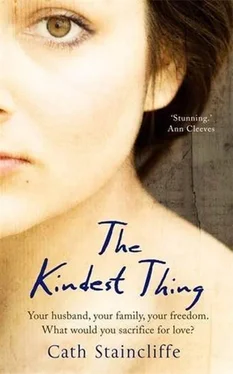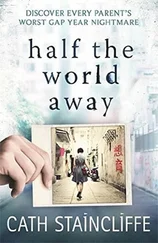‘You are the daughter of Neil Draper and Deborah Shelley?’
‘Yes.’
‘And on the twenty-fourth of June, nine days after your father’s death, you made a phone call to the police?’
‘Yes, I did.’
‘What did you tell the police?’
My throat is tight and there’s a burning around my ears. I concentrate on my breathing, taking air in slowly through my nose.
‘That I thought my mum had something to do with my dad dying.’
There are gasps and sharp intakes of breath from around the court. Dolly puts her hand over her mouth in shock. Sophie blinks, tightens her lips with resolve.
‘Please can you tell us what happened on the afternoon of June the fifteenth?’
‘I was on my way home from school when Mum rang me, to tell me Dad had died.’
‘Were you surprised?’
‘Yes, he’d been fine that morning.’ There are tears in her voice and my heart rips. Resentment ripples through me. I want to leap across the space and gag Miss Webber, free Sophie from the ordeal.
‘You’d seen him earlier in the day?’
‘I said goodbye before school.’
‘You got the phone call. What did you do next?’
Her voice is firmer. ‘I went home. Mum was there and we went upstairs.’
‘You saw your father?’
‘Yes.’
Callow Youth is following Sophie’s testimony carefully. Perhaps he relates to her because she’s closer to his age than any of the other witnesses. And she’s gorgeous, of course.
‘And then?’
‘I asked her if we could do anything, like the kiss of life and she said it was too late. There was an ambulance coming. Then I rang Grandma and Grandpa to tell them.’
‘Your mother hadn’t called them?’
‘No.’
I am neglect on legs.
‘And your brother?’
‘She said his phone was off.’
I sense rather than see Adam flinch. It had been another few hours before he had come barrelling home to find the sky had fallen. His absence he saw as another failure to carry with him, another brick in the basket.
‘How did your mother appear?’
‘A bit upset.’
‘She was crying?’
‘A bit.’
‘Did she tell you anything about events that day?’
‘Just that she had gone upstairs and couldn’t wake him.’
‘Nine days later you called the police. You told them you suspected your mother of involvement in your father’s death. Why did you think that?’
‘Well, he died really suddenly. He was okay when I went to school. They’d told us about MND and what would happen and it wasn’t like that at all.’
‘Was that the only reason?’
‘No. I knew Mum had been looking on the Internet at sites about assisted suicide, euthanasia.’
‘How did you know this?’
‘She never deletes her browsing history.’
Flo narrows her eyes; perhaps she’s not a silver surfer. But Miss Webber is prepared for this and has a follow-up question. ‘So when you went on the computer you could see a list of previous websites that had been visited?’
‘Yes.’
‘Perhaps your father had been looking them up?’
Not unless he’d regained the use of his legs, got himself down there without help.
‘It’s her computer – it’s a Mac for her work. He didn’t really go on it.’
‘And was there anything else that alerted your suspicions?’
Sophie swallows. She licks her lips. My hands hurt: my fists are bunched, my nails cutting into my palms. I uncurl them, clasp my hands tight together.
‘Well, when I first got back and I wanted to know if we could do anything I asked her if she had tried the breathing space kit – I thought maybe that might help. She just said it was too late, but later when I went to look for the breathing space kit I couldn’t find it.’
‘You knew where it was usually kept?’
‘Yes, in the kitchen, in the middle cupboard. We all knew where it was and what to do if Dad was choking or couldn’t breathe.’
‘And this kit was missing?’
‘Yes.’
‘Do you know what drugs it contained?’
‘It was morphine, I think, and something else, a sedative but I don’t know what it was called.’
Midazolam. We hadn’t used that. If Neil had taken it as well, might the end have been different? My mind veers away from the memory.
‘What did you think had happened to the kit?’
‘I thought she’d hidden it, my mum.’
‘Why?’
‘Because she’d given him the drugs but she didn’t want anyone to know.’ Her answer is fluent, logical.
‘Can you tell us what happened after you phoned the police?’
‘They wanted to talk to me in person.’
‘And you agreed?’
‘Yes.’
‘You made a visit to the police station the following day?’
My mind flew back, dipping around dates and memories. Ten days after – she’d have still been at home, wouldn’t she? But everything became hazy in those days after Neil’s death. What had she told me? That she was going into school? I couldn’t recall.
‘You spoke to the police and they asked you if you would be prepared to make a statement?’
‘Yes.’
‘They asked you whether you would be prepared to testify, if the case came to court?’
‘Yes.’
‘You agreed to those requests. You are here today. Can you tell the jury why you decided to help the police?’
‘It was the right thing to do.’ She is simple in her certainty, steadfast. My Antigone. I could use exactly the same words in my own defence – except I have to pretend that what I did was very much the wrong thing. And as for Antigone, after defying the authorities to honour her dead brother with a burial she was walled up and hanged herself.
‘Sophie, can you tell us how your mother seemed in the months leading up to June last year?’
Sophie hesitates a moment. I don’t think she’s unsure. I think she’s choosing her words carefully. ‘The same as usual.’
‘Did she complain of strain or stress?’
‘No.’
‘Did she seem withdrawn or depressed?’
‘No.’
We are getting to the heart of the matter. This is what the trial pivots around – was I off my trolley or not? Ms Gleason summed it up: battle of the shrinks. And Sophie is the opener, the first line of attack who may be sacrificed but serves to expose chinks in the enemy’s line, root out weaknesses and gaps, to illuminate the pattern for the next assault.
‘Had she exhibited any signs of anxiety, any panic attacks?’
‘No.’
‘Did your mother behave in any way that made you think she was mentally ill?’
‘No.’
Each ‘no’ rings out calm and clear. Sophie tucks her hair back again.
‘Did she continue to care for you and your brother in those months?’
‘Yes.’
‘And she was working?’
‘Yes.’
‘And running the house?’
Isn’t that little lot reason enough to go doo-lally? Or are we running along the lines of the Protestant work ethic here? Busy hands equal a healthy life.
‘Would you say your mother coped well with your father’s illness?’
Stupid question. How can anyone know how I coped? That’s what coping’s about, isn’t it, swallowing the trouble and soldiering on?
‘Yes.’
‘Thank you.’
As Mr Latimer rises to his feet, adjusting his robe around him, I push my feet into the floor and grip the edge of my seat. Some of the jury stiffen too. Mousy’s chin goes up, her expression sombre, and Media Man straightens his shoulders, uncrosses his legs.
‘Miss Draper, is it true that your mother suffered from insomnia?’ Mr Latimer jumps in without any preamble, though his tone is soft enough. He even stutters a little on ‘insomnia’.
‘Yes.’
‘Was this a constant problem?’
Читать дальше












